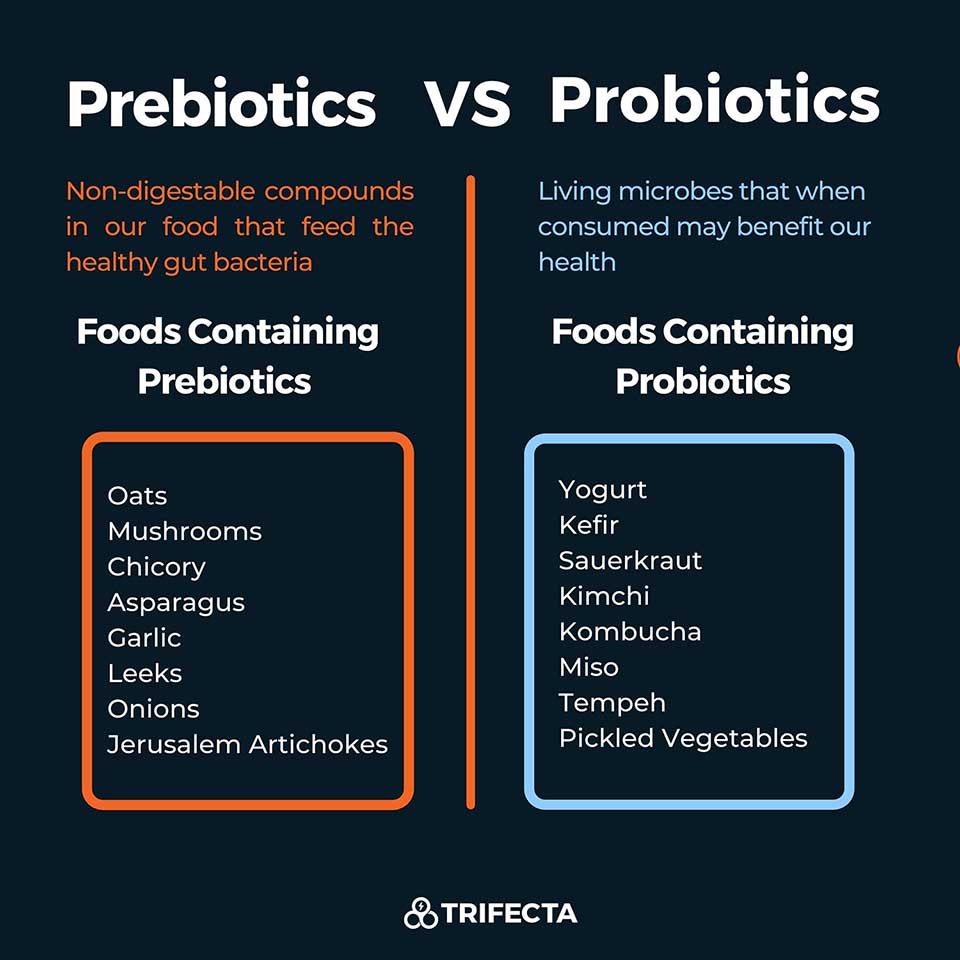You may be hearing the words prebiotic and probiotic come up more often in conversations around wellness as our gut health plays a big role in supporting our health and well-being. So what's the difference between prebiotics and probiotics and how do they affect our health?
We've de-coded what you need to know about Prebiotics and Probiotics and how your diet affects your gut health.
Why Gut Health Matters
Both probiotics and prebiotics impact the health of our gut, one of the most complex parts of the body.
Our gut microbiome and the microorganisms that inhabit it play a big role in things like (1,2):
- digestion and energy metabolism
- regulating our immune system
- defense against harmful pathogens
- assimilation and absorption of nutrients
When our gut health is suboptimal or lacks enough good bacteria, we increase our risk for developing a variety of health issues. This can also cause a slew of unwanted symptoms such as bloating, indigestion, constipation and/or diarrhea, and frequent nausea.
An altered gut microbiome may increase intestinal permeability (leaky gut) meaning our guts are more prone to irritation and inflammation (3).
Disturbances in our gut microbiome have been linked to numerous systemic diseases, such as cardiovascular disease, gastrointestinal disease, type 2 diabetes, obesity, and auto-immune conditions but through what means is still under investigation (4,2,5).
It's important to note that even though more research begins to emerge about our gut microbiome and gut health, this field is still young.
How Does Our Gut Become Unhealthy?
The great Ancient Greek physician Hippocrates once said, "All disease begins in the gut" and emerging evidence suggests he really wasn't that far off!
Once you start digging into the research it is no surprise that our diet plays a key role in regulating the health of our gut microbiome and modulating the amount of good and bad gut bacteria.
Diets high in processed carbohydrates, sugars, and unhealthy fats have been strongly associated with decreased microbiome diversity and implicated in the development of chronic diseases (6).
There are other factors that may impact our gut microbiome as well. Some limited research suggests that certain pesticides used in farming or residual pesticide residues found on and in our food may disrupt our gut health, fostering harmful bacteria (7).
Antibiotics might also influence our gut health as they disrupt both good and bad bacteria (8). While they help us fight off harmful pathogens in the short term, research is evaluating the long-term impact of antibiotic use, as overuse of antibiotics may lead to gut dysbiosis and negatively impact our health later on in life (9). There are also some environmental impacts to consider, as we are exposed to a myriad of chemicals and hormones daily.
So how do we help support healthy digestion and a gut microbiome?
We can start by becoming more mindful about what we eat, feeding healthy gut bacteria by incorporating prebiotics and probiotics foods.
What's the Difference Between Prebiotics and Probiotics?
Prebiotics, along with probiotics, and a healthy diet help create balance in our gut and support whole-body health. But each plays a different role in terms of how they interact with our gut microbiome.
In a nutshell, probiotic foods, and supplements are thought to add more beneficial bacteria to our gut microbiome, which feed on prebiotics to help them grow.

What is Prebiotics?
Prebiotics is a term used to describe mostly non-digestible fibers that act as food for the 'good' bacteria within our guts (10).
There are many types of prebiotics, but the majority of them are from foods containing higher amounts of complex carbohydrates such as oligosaccharides, polysaccharides, and dietary fibers (11,12). Some examples of these include inulin, pectin, beta-glucans, and fructans. These fibers promote the movement of material through our digestive system, supporting gut motility.
You can easily increase your intake of prebiotics by consuming more whole foods in your diet! Food sources of prebiotics include:
- Soybeans
- Leeks
- Peas
- Jicama
- Whole Grains (oats)
- Jerusalem Artichokes
- Oats
When we eat a diet rich in prebiotic foods we feed and nourish the "good bacteria" in our gut, which in turn ferment some of the more complex carbohydrates (such as inulin, an insoluble type of fiber) and produce metabolites called short-chain fatty acids, which the beneficial probiotic bacteria feed on.
These short-chain fatty acids are also absorbed by the cells in our intestinal lining and are the main source of nutrients for those cells. Short-chain fatty acids, such as butyric acid, help keep our gut barrier strong, reducing inflammation and permeability (2).
What are Probiotics?
Probiotics are living, non-pathogenic, microorganisms found in fermented foods and supplements that reinforce similar micro-organisms naturally present in our gut.
More specifically the International Scientific Association for Probiotics and Prebiotics defined probiotics as living microorganisms that provide a health benefit when consumed in the right amounts (13).
Think of them like soldiers coming to lend the army a helping hand to similar microorganisms already living in our body, as they are both part of the same team.
Our gut microbiome is a symbiotic collection of over 100 trillion different microorganisms and bacteria, but only a small portion of those microorganisms have been identified and are used as probiotics (7). It is a complex and challenging process to identify specific bacteria within our gut, and even more challenging is the task of growing that bacteria outside of our gut to study and deemed safe for commercial use in supplements.
When it comes to commercially produced probiotics, the majority of research has been focused on two specific strains; Lactobacilli and Bifidobacteria. These strains are thought to be the two most common forms of probiotic bacteria that reside in our digestive tract.
Other not-so-common strains include Bacillus and Saccharomyces boulardii. However, Saccharomyces boulardii is actually yeast and not a bacteria.
If you're looking to increase your intake of probiotics without the use of supplements, you can try incorporating more fermented foods into your diet every day.
Fermented foods such as:
- Cottage Cheese
- Kefir
- Sour Cream
- Yogurt (plain, active cultures)
- Aged Cheeses
- Buttermilk
Non-Dairy:
- Fermented vegetables (like sauerkraut and kimchi)
- Kimchi
- Kombucha
- Kvass
- Miso and Natto
- Raw Pickled Vegetables
- Tempeh
That being said, diversity could be key when looking to take care of your gut because the more diverse your diet, the greater diversity in your gut microbiome.
Should You Take Probiotic Supplements?
Adding probiotics to your diet through eating probiotic-rich foods may be enough probiotics needed to improve digestion slightly, but if you plan on using probiotics for a specific medical condition, talk to your primary care practitioner beforehand about finding the right probiotic supplement or if it is right for you.
Probiotic supplements come in capsules, powders, liquids, and other forms, and many contain a variety of strains and concentrations, making it difficult to study the effects of commercial products containing 'probiotics' (13).
Some research suggests probiotic supplementation may help manage digestive disorders like irritable bowel syndrome (IBS) and other digestive symptoms such as diarrhea, bloating, and constipation when used consistently for a minimum of 4-6 weeks (14,15).
But these studies acknowledge the limitations of their research because when you take the probiotic supplement, what type of probiotics, and your current diet and lifestyle can all impact the potential benefits of supplementation.
Another concern for probiotic supplementation is that the FDA doesn't monitor the manufacturing of probiotics, they only require the manufacturers to list the total weight of the microorganisms on the product. This can be misleading as the supplemental facts label can include a total mass that consists of both live and dead microorganisms.
Probiotics must be consumed alive to confer any of the potential health benefits, and they are not shelf-stable microorganisms, so finding a high-quality probiotic can be challenging.
At the end of the day, probiotic supplements can be helpful in supporting gut health but we still need further evidence to help us define how effective they are in individuals with specific medical conditions, and if and when they are safe.
Is One Better Than The Other?
It is hard to say that one may be more beneficial than the other as eating foods rich in both prebiotics and probiotics can be a well-balanced approach for a nutrient-dense diet.
Prebiotic foods are often nutrient-dense, so consuming more of these whole foods may in turn increase your intake of beneficial vitamins and minerals such as vitamin K, potassium, magnesium, and vitamin A.
Most of their prebiotic benefits are also thought to come from the dietary fiber they contain, high-fiber diets have been shown to help normalize bowel movements, lower cholesterol levels, control blood sugar, and stay satiated for longer after meals (16).
Probiotics on the other hand may target your gut microbiome more directly than prebiotics, especially when consumed in high amounts in supplement form. But we don't know yet if more is better when it comes to probiotics.
Supplements measure probiotics in colony forming units (CFU), indicating the number of viable or 'alive' microbes, and many supplements contain 1 to 10 billion CFU per 'dose'. This information is not provided on most fermented foods so again the jury is still out on if these alone will make a difference.
If you have been considering starting a probiotic supplement, it may be easier to address your diet first. There are plenty of prebiotic and probiotic foods you can incorporate into your weekly meal plan before turning to supplements.
Health Benefits From Prebiotics and Probiotics
Because both prebiotics and probiotics can be found within the foods we eat, our diet is considered one of the main drivers in shaping our gut microbiota and consuming a diet high in whole foods like fruits and vegetables along with fermented foods like yogurt and fermented vegetables is thought to support a healthy gut microbiome (7).
Focusing on nourishing healthy bacteria in our gut with prebiotics and probiotics can benefit our health by (2):
- regulating blood sugar levels
- maintaining a healthy weight
- reducing blood lipids like cholesterol
- supporting healthy intestinal motility
There are also specific diets and protocols often recommended by dietitians when gut issues are suspected. Following some of these therapeutic food plans and working alongside a Registered Dietitian (RD) or Certified Nutrition Specialist (CNS) may help identify potential food sensitivities or intolerances and restore balance to your gut and overall health.
Examples of these diets include:
When it comes to incorporating any kind of beneficial foods into your diet, consistency is key. Eating prebiotic food or probiotic food here and there while still consuming a diet high in processed foods and sugars will not have the same effects as sticking to a consistent diet high in whole foods and within a healthy caloric range for you.
Look for a meal plan to nourish your gut microbiome without having to scour the grocery store and spend hours in the kitchen. We've got you covered with ready-to-eat, organic meals shipped directly to your home.
Pick a meal plan that meets your food preferences while getting the bulk of your nutrition and macros


